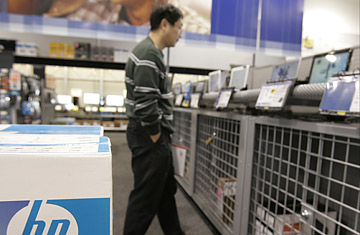
Results from HP and other computer companies show why the PC market may never go back to its former growth rate.
Domestic car sales are down about 30%. Sales at Chrysler have been hit hardest, down 50% in the most recent two months. In a bad economy, it makes sense that consumers will avoid a $25,000 purchase. Analysts and economists are trying to figure out how much people are willing to spend for almost everything. Will they buy a new refrigerator for $500 if their current model is old but not broken? The data from the last quarter indicate that they won't.
Two industries were supposed to do relatively well when purchasing power got into a tough spot — cell phones and PCs. It may be that the focus on tech growth potential has been too much about Apple (AAPL) which has done well, at least in its most recent quarter. But, Apple is as much a cult as a business. Some people will borrow themselves into the poor house to own a new Mac or iPhone. (Read "How to Know When the Economy Is Turning Up".)
As the news about PC and cell phone sales begins to trickle out company-by-company, it is becoming clear that a $199 handset or a $999 PC are not on the consumer's shopping list. Nokia (NOK), which has 40% of the world's handset market reported that global sales would contract in 2009. That is unheard of. It means that fewer people are upgrading old phones in developed markets and fewer people are buying a first phone in developing countries.
If every American home had a car in 1920, a phone in 1930, and a TV in 1960, the PC is the household appliance of the last 20 years. Most households have one PC. Some have two or three depending on how many children are in the house. The cycle of upgrading PCs has been fairly steady. It has been driven by more powerful processors from companies like Intel (INTC), new operating systems from Microsoft (MSFT), and broadband which gives the PC owner access to a universe that did not exist a decade ago.
PC sales are not growing any more. As a matter of fact, they are shrinking and the drop is accelerating. Hewlett-Packard (HPQ), the largest manufacturer of PCs in the world said that its revenue from notebook PC sales dropped 13% in the last quarter and desktop revenue fell 25%. It is likely that results from Dell (DELL) will not be any better when it posts its quarter. Wall St analysts are starting to say that their surveys of retail outlets even show Apple Mac sales slowing.
What happened to the PC? It has turned out to be too much like a car. Once a household has two or three of something, no matter how useful it is, sales of that item are going to slow down. The PC is no exception. IBM (IBM) brought its PC to market in 1981 and launched the age of personal computing. The first machine went for $1,565, so for all the processing power that new machines have, pricing has not changed much.
The other factor that is undermining PC sales is that they are too well built. A typical Intel processor that is two years old has more power than almost anyone needs. Laptops made two years ago were light and had impressive battery life. The screen resolution from most machines bought in 2006 is fine for watching online videos or DVDs. And, PCs used to come with Window XP, which is still preferred to the current Microsoft product, Vista.
PC sales are falling. They will continue to drop. Consumers and businesses can't afford new computers and the old ones work so well that there is no need for upgrades. Why buy a new car when the one with 60,000 miles on it runs like new?
— Douglas A. McIntyre
Read "25 People to Blame for the Financial Crisis."
For constant business updates, go to 24/7wallst.com.
